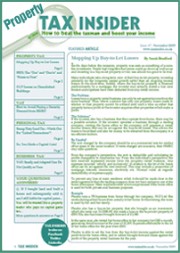Before you go, sign up to our free tax saving email course. Get 7 top property tax saving strategies in your email inbox that will help you save thousands in tax. Unsubscribe any time.
 Mark McLaughlin highlights a selection of potential tax pitfalls when creating UK trusts to hold investment property. Mark McLaughlin highlights a selection of potential tax pitfalls when creating UK trusts to hold investment property.The use of trusts is a fairly popular way of passing wealth down generations. For example, an individual (who is resident and domiciled in the UK) may wish to set up a discretionary trust to hold an investment property, to provide income to family members, and ultimately a capital asset that will hopefully appreciate in value. However, there are a number of potential tax traps to avoid in the above example for the settlor of a discretionary trust in the UK. This article highlights three common pitfalls in such circumstances, although of course there are potentially others. 1. Income tax – It’s still your income! Income tax anti-avoidance provisions (the ‘settlements’ rules) can result in the trust’s rental (and other) income being treated as the settlor’s income, if he or she retains an interest in the trust, such as by being a potential beneficiary (ITTOIA 2005, s 624). Even if the settlor cannot benefit personally, he or she is still generally ‘caught’ if their spouse (or civil partner) can benefit. Furthermore, even if the settlor (and spouse) retains no interest in the trust, income is generally treated as the settlor’s for income tax purposes if it is paid to, or for the benefit of, a ‘relevant child’ (i.e. a minor, who is unmarried and not in a civil partnership) of the settlor, and that income exceeds £100 in the tax year (ITTOIA 2005, s 629). This tax treatment applies to the extent that the trust income is distributed to (or for) the child. However, income accumulated and retained within a discretionary trust is not affected unless and until it is paid to the child (if unmarried and not in a civil partnership) (see s 631). 2. Capital gains tax – It’s still your gain! The settlor may give cash to the trust to enable the trustees to buy the investment property. Alternatively, the settlor may gift a property instead. In the latter case, the gift will be a deemed disposal at market value for capital gains tax (CGT) purposes. This could result in a chargeable gain for the settlor, even though no proceeds are received for the property. A form of CGT relief (‘holdover’ relief) generally applies to transfers on which inheritance tax (IHT) is chargeable, such as the gift of a property to a discretionary trust (TCGA 1992, s 260(2)(a)). However, this relief is subject to various conditions and exceptions, including that the trust must not be ‘settlor interested’. A settlor is regarded as having an interest in the settlement broadly if (among other things) their ‘dependent child’ (i.e. a child, including a stepchild, who is under 18 years old, unmarried and does not have a civil partner) can benefit from the trust (TCGA 1992, s 169F(4A)). Transferring an investment property into a discretionary trust will therefore require careful consideration if such a child is a beneficiary and the property is standing at a gain. 3. Inheritance tax – It’s still (treated as) yours! For inheritance tax (IHT) purposes, the gift of cash or a property to the discretionary trust will be an immediately chargeable transfer. Anti-avoidance provisions (‘gifts with reservation’ (GWR)) are broadly aimed at preventing individuals reducing their exposure to IHT by making lifetime gifts (which they hope to survive by at least seven years) whilst continuing to have the use or enjoyment of the assets. If caught by the GWR rules, the trust property can be treated as part of the settlor’s estate for IHT purposes. The GWR rules potentially apply (among other things) to trust property. The settlor should therefore be excluded from benefiting under the trust, either as an actual or a potential beneficiary. For example, care is needed with family trusts. If the settlor creates a discretionary trust in which his spouse is a potential beneficiary, this does not, of itself, constitute a GWR. However, a trust distribution to the spouse may be a GWR if the settlor can share in the benefit of that distribution (e.g. if it is paid into a joint bank account of the settlor and spouse). In addition, if the settlor is a trustee, any remuneration received for being a trustee should be reasonable and not excessive (see HMRC’s Inheritance Tax manual at IHTM14394). If a gift of shares (e.g. in an investment property company) is being made into trust, care is needed if the settlor is a paid director of the company (e.g. in respect of any new remuneration arrangements), to reduce the possibility of the gift being considered by HMRC to be a GWR (see IHTM14395). Practical Tip: This article only briefly outlines a selection of complex anti-avoidance rules. There are potentially other tax (as well as non-tax) implications to consider (e.g. stamp duty land tax in England and Northern Ireland, land and buildings transaction tax in Scotland, and (from April 2018) land transaction tax in Wales), depending on the circumstances. This is a sample article from the monthly Property Tax Insider magazine. Go here to get your first free issue of Property Tax Insider.
|


 Tax Articles
Tax Articles